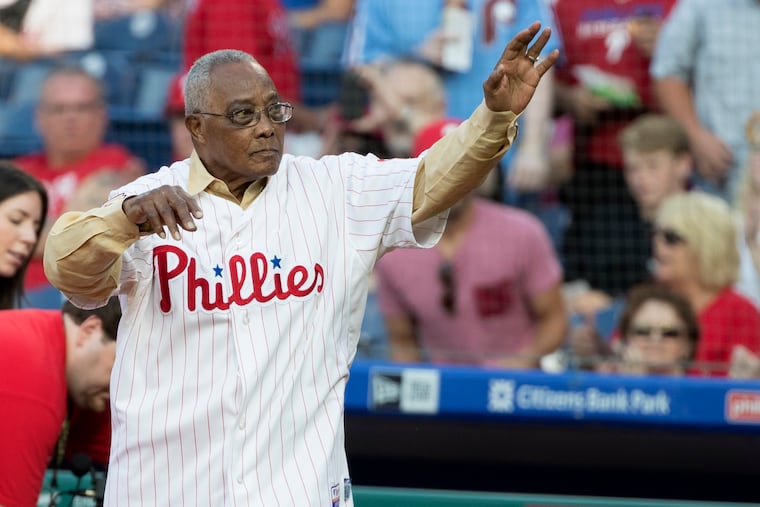Phillies fan favorite, defensive whiz Tony Taylor dies at 84
Mr. Taylor played 15 seasons with the Phillies, tied for third in franchise history. He was an All-Star in 1960, his first year with the Phils.

Tony Taylor, the smooth-fielding Phillies second baseman of the 1960s who grew up on a sugar plantation in Cuba and became one of the most popular players in franchise history, died Thursday morning. He was 84.
Mr. Taylor played 15 seasons with the Phillies, which is tied for third in franchise history. He was apprehensive about coming to Philadelphia in May 1960 after being traded by the Cubs, but those feelings were quelled when he received a standing ovation in his first game at Connie Mack Stadium.
It was the start of a decades-long love affair between a hard-nosed player and a hardened fan base.
Mr. Taylor was an All Star in 1960, played in all but 12 games for the star-crossed 1964 Phillies, and held the franchise record for games played at second base (1,003) before Chase Utley passed him. The Phillies added Mr. Taylor to their Wall of Fame in 2002.
Mr. Taylor died from complications from a stroke he suffered last August after leaving an alumni event at Citizens Bank Park. He is survived by his wife, Clara, and his children.
“Tony was undeniably one of the most popular Phillies of his or any other generation,” Phillies managing partner John Middleton said. “His baseball talent was second only to his warm and engaging personality, as he would always make time to talk with fans when he would visit Philadelphia for Alumni Weekend.
“Growing up as a Phillies fan, my favorite memory of Tony is the remarkable play he made to save Jim Bunning’s perfect game. It was the play of the game and it was thrilling to see it back then. It remains equally thrilling today to watch Tony turn a sure hit into an out. On behalf of Leigh and myself and the entire Phillies organization, we send our deepest condolences to Clara and all of Tony’s family and friends.”
Mr. Taylor was the team’s top base stealer six times and led National League second basemen in fielding percentage (.986) in 1963. Mr. Taylor played all four infield positions for the Phillies and finished his career with a .976 fielding percentage.
“Every time I put on the uniform, I have so much fun,” Mr. Taylor said in 1985. “That’s why I got into baseball in the first place, because I loved it. To me, the day isn’t right until you put on the uniform and cross the white line. And when you walk back in the locker room and take off the uniform, that’s it, that’s when the fun stops.”
The Phillies traded Mr. Taylor to Detroit in June 1971 as the last-place team tried to move its popular player to a contender while adding a pair of prospects. But Mr. Taylor was crushed and cried in the clubhouse at Veterans Stadium. He had purchased a home in Delaware County, become a fan favorite, and wanted to spend the rest of his career with the Phillies.
“This is my home,” Taylor said that night.
He returned to the Phillies in 1974 as a free agent, joining a team that was suddenly on the brink of contention. The 38-year-old veteran was a reserve infielder that season and led the Phillies with 17 pinch hits, often receiving standing ovations when he came to the plate. His 54 career pinch hits rank second all-time among all Phillies, trailing only Greg Gross (117).
“The way the fans received me when I came back, the ovations they gave me, it showed me how much they appreciated the way Tony Taylor played baseball — hard, always hard,” Mr. Taylor said. “It meant so much to me. It showed they remembered. It showed they cared.”
Mr. Taylor recorded his 2,000th career hit in 1975 and retired after the 1976 season. He spent the next three seasons as the Phillies’ first-base coach before becoming a minor-league instructor in 1980. He received a championship ring when the Phillies won the World Series. Perhaps that ring helped make up for the collapse in 1964.
“It’s hard to explain to people what happened,” Taylor said in 1979, 15 years after the Phillies blew a 6 ½-game lead with 12 games to play. “We still can’t explain it — even to ourselves.”
Mr. Taylor managed in the Phillies minor leagues from 1982 to 1987 before returning to the majors as the first base coach in 1988 and 1989. His goal was to manage in the big leagues, but he was never given the chance. He worked for the Giants from 1990-1992 and the Marlins for 12 seasons.
Mr. Taylor joined the Marlins as a minor-league instructor before their inaugural season, placing him with an organization with a large Cuban fan base. He was not with the Marlins in 2003 when they won the World Series, but he rejoined the team before the 2004 season as their bullpen coach.
Brad Penny, one of the team’s top pitchers, handed Mr. Taylor a box before a game in April 2004. Inside was a World Series ring, purchased by Penny for Taylor. Penny told Mr. Taylor that he deserved the ring for all the years he spent with the Marlins. Four decades after becoming a fan favorite in Philadelphia, Taylor was just as popular in Miami.
“As long as I’m around baseball, I love being anywhere,” Mr. Taylor said while coaching in Reading in 1985. “It’s fun. It was like that when I came to this country from Cuba, making $125 a month in Class A. And it’s still like that now.”